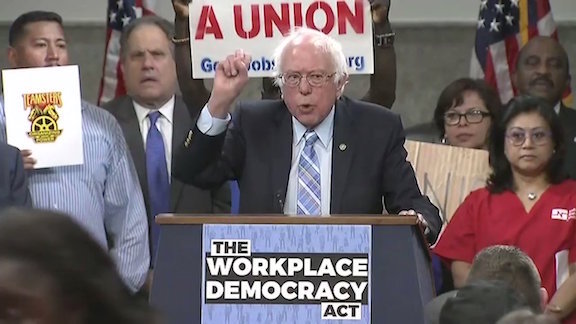|
 
Continued from main page…
May 10, 2018 – Jose Ramirez, a former XPO Logistics driver from Aurora, Ill. who was fired for his union activity, said during a Capitol Hill press conference today that the bill would prevent businesses from bullying worker who are trying to organize. “Companies like XPO use fear and coercion to scare their workers from forming their own union,” he said. “This bill would protect workers’ federal right to organize and ensure that what happened to me couldn’t happen to them.”
Beyond ending RTW, the bill would 1) allow unions to organize through a majority sign-up process; 2) enact first contract provisions to ensure companies cannot prevent a union from forming by denying a first contract; 3) expand the definition of employer to limit workers being classified as independent contractors; 4) allow for secondary boycotts and picketing; and 5) expand and update the “persuader rule” to limit the use of outside union busters.
Teamsters General President Jim Hoffa said the legislation would stem rising inequality in this country. “Union workers on average make $11,000 more a year than non-union workers,” he said. “They also have better health and retirement benefits and are safer on the job. If lawmakers want to expand the middle class, this bill is the vehicle to get it done.”
“We must no longer tolerate CEOs and managers who intimidate, threaten or fire pro-union workers, who threaten to move plants to China if their workers vote in favor of a union, and who refuse to negotiate a first contract with workers who have voted to join unions,” Sanders said. “If we are serious about reducing income and wealth inequality and rebuilding the middle class, we have got to substantially increase the number of union jobs in this country.”
Co-sponsored by U.S. Representative Mark Pocan (WI-02), the legislation was introduced in the House and Senate Wednesday, May 9 and included many Democratic co-sponsors, including Senator Chris Van Hollen (D-MD) and Representative Robert C. “Bobby" Scott (VA-03).
“Republicans like President Trump and Governor Walker continue to crack down on unions and push a special interest, corporate-driven agenda that makes it harder for middle class families to get ahead. And while they stack the deck against the American worker, unions are fighting to expand economic opportunity and strengthen the middle class,” said Pocan, a member of the International Union of Painters and Allied Trades. “The Workplace Democracy Act restores real bargaining rights to workers and repeals the right to work laws like those that Governor Walker has used to undercut American workers. I’m proud to introduce this legislation with Senator Sanders and stand up for the millions of middle class families who are under attack by Republican leaders.”
The Workplace Democracy Act would make it easier for workers to join unions in a number of ways:
• It would end right to work for less laws by repealing Section 14(b) of the Taft Hartley Act, which has allowed 28 states to pass legislation eliminating the ability of unions to collect fair share fees from those who benefit from union contracts and activities.
• Under the legislation, when a majority of workers in a bargaining unit sign valid authorization cards to join a union, they must have a union. Companies would not be allowed to deny or delay a first contract with workers who have voted to join a union. Unions would be given the right to have their voice heard through secondary boycotts and picketing. And workers would have the right to know when their company spends millions of dollars running anti-union campaigns.
• The bill would also stop employers from ruthlessly exploiting workers by misclassifying them as independent contractors or denying them overtime by falsely categorizing them as a “supervisor.”
Read the summary of the bill here.
Read the Senate bill here.
|